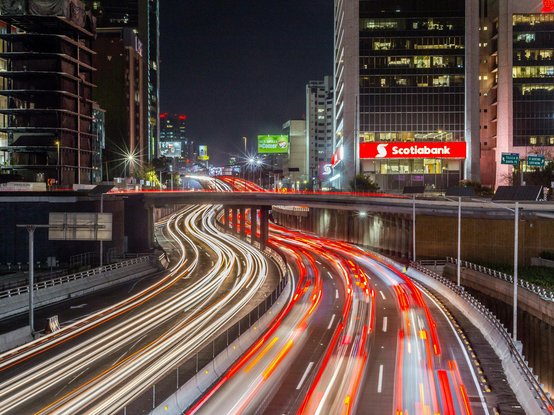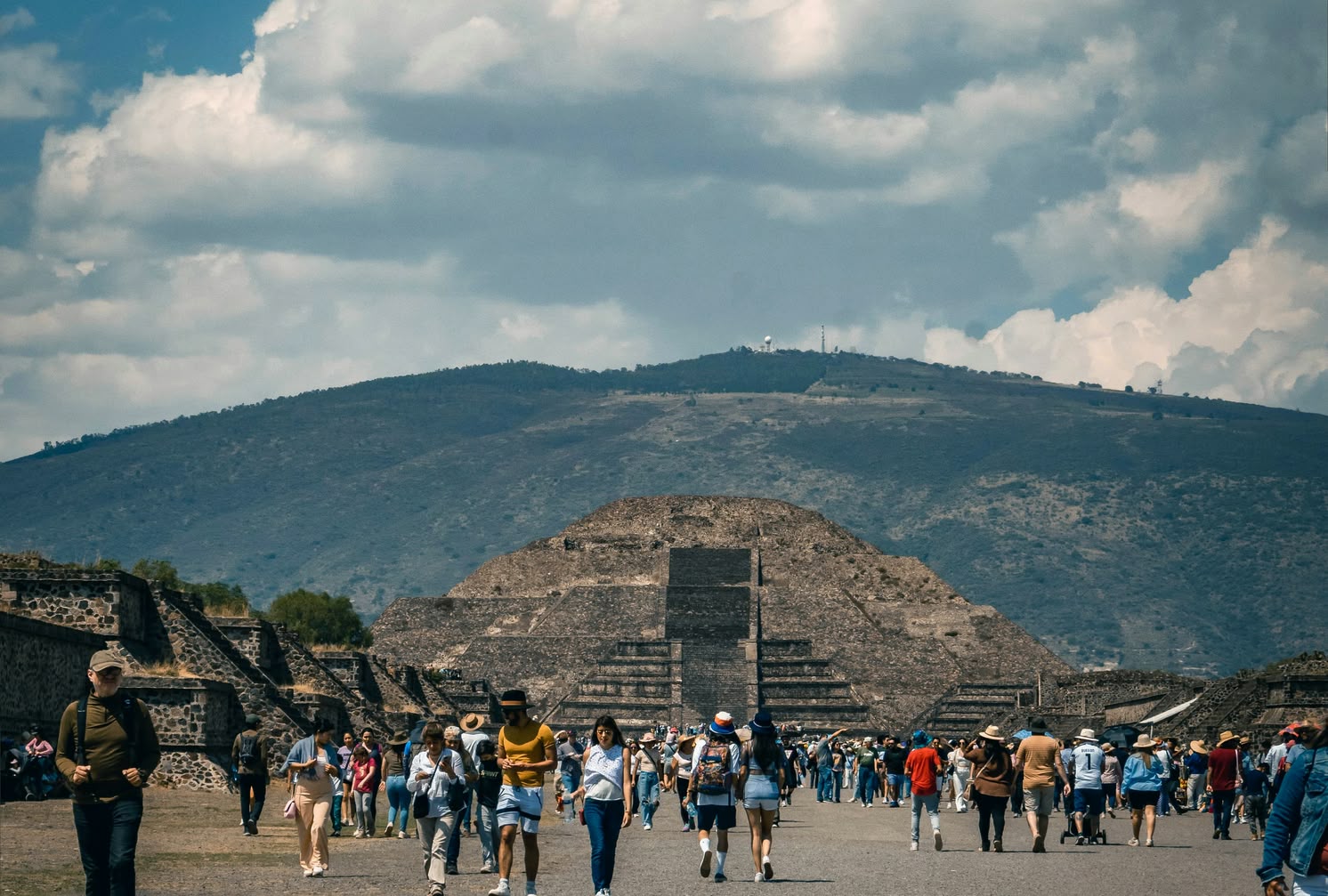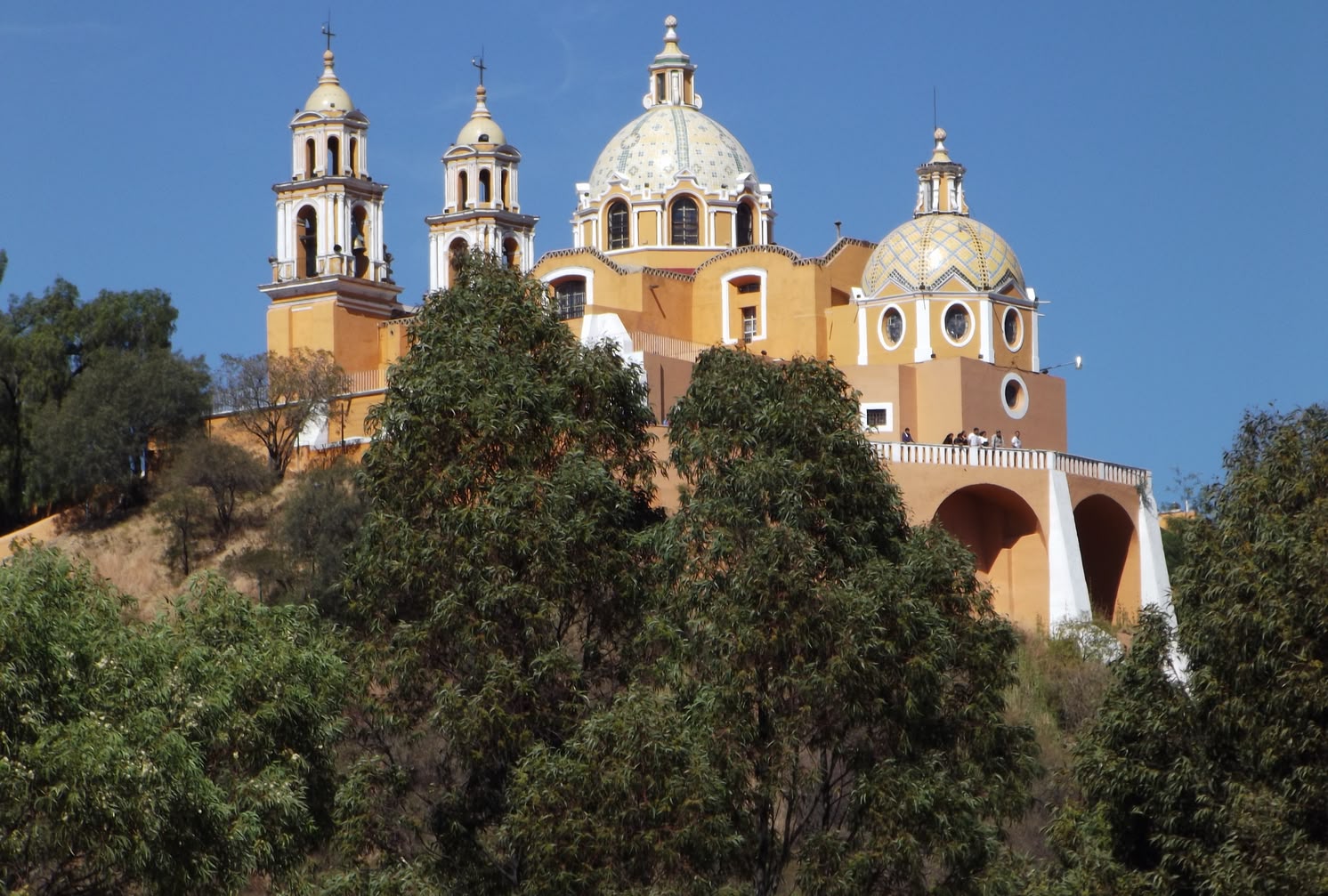On the road in Mexico
Mexico's transport system offers travellers a wide range of options for exploring the country. From modern motorways connecting major cities and tourist regions to public transport such as buses, metros and taxis, getting around is relatively easy and affordable. Traffic in Mexico City is often heavy and can cause significant delays during rush hour, presenting challenges for motorists. There are toll roads ("cuotas") for faster travelling, but there are also free alternatives. Rural areas can have more remote roads that are less well maintained, which requires careful planning.
Traffic on Mexico's roads

Road traffic in Mexico varies greatly depending on the region and city. Driving in Mexico can be both an exciting and challenging experience, especially in large cities such as Mexico City, Guadalajara and Monterrey where traffic density is often high and delays can be significant during rush hour. The roads are often congested, so it is advisable to allow plenty of time for journeys.
The road infrastructure also varies greatly: In urban areas, roads are generally well developed, while rural regions sometimes suffer from poor road conditions.
Roadworks and unforeseen road closures can cause additional delays. To travel safely and efficiently on Mexican roads, it is important to take these factors into account.
Public transport
Mexico has an extensive public transport network that includes buses, metros and taxis. In Mexico City, the metro system is efficient and cheap, while buses are a good way to get around other cities. Taxis and ride-hailing apps such as Uber are also widely available.
Mexico's rail network

Mexico City has an extensive and cost-effective metro system that is considered one of the largest in the world. It consists of 12 lines that cover most neighbourhoods and offer an efficient way to get around the city.
Ferrocarriles Suburbanos is a network of suburban trains that connects Mexico City with cities such as Toluca and Cuautitlán. These modern trains offer regular schedules and are a convenient, fast option for commuters who want to avoid traffic on the roads.
There are some long-distance connections in Mexico, such as the El Chepe, which runs from Chihuahua to Los Mochis and is known for its scenic route through the Copper Canyon region. These trains are often less frequented, but connections are limited.
Bus transport in Mexico

In cities like Mexico City, there is an extensive network of city buses that run frequently and at affordable prices. However, the buses can be overcrowded at peak times.
Long-distance bus lines - One of the most popular transport options for travelling between cities. Companies such as ADO, Estrella Blanca and Flecha Roja offer comfortable and affordable connections throughout the country.
Collectivos are small vans that run frequently on certain routes and offer a flexible and cost-effective option for travelling within cities or to nearby destinations.
Don't miss the chance to make your dream trip a reality! Contact our experienced travel consultants now and let them inspire and advise you for your trip. Take the first step towards your unforgettable adventure!
Mexico round trips - culture, nature, history

Mexico Día de Muertos
- World-famous Mexican festival of the dead
- Archaeological sites of Oaxaca
- Cartagena's historic old town

Mexiko Cities and the Sea
- Aztec ruins of Teotihuacán
- Magical villages of Puebla, Cholula and Atlixco
- Relax on the beaches of Playa del Carmen

Traditional Mexico
- Hearty Mexican cuisine
- Ruins of Teotihuacán
- Magical villages of Cholula and Atlixco
What you need to bear in mind when travelling in Mexico
The traffic rules in Mexico are similar to those in the USA and Europe, but compliance varies. Speed limits of 40-60 km/h apply in urban areas, while they can be up to 100 km/h on rural roads. It is important to pay attention to road signs and drive defensively as not all drivers obey the rules. Especially at night, safety concerns can arise in certain regions. It is therefore recommended to use well-lit and busy roads and to favour public transport or taxis in some areas. Driving in Mexico can be both an exciting and challenging experience, especially in busy cities like Mexico City.
Avoid travelling by car at night in remote areas. It is recommended that you only take official taxis and avoid unguarded car parks.
Although similar to those in Europe, they are not always strictly followed. A particularly defensive driving style is recommended.
In large cities such as Mexico City, there is often heavy traffic, especially at rush hour. Country roads can often be uneven in rural areas.
Many motorways (autopistas) are subject to tolls, but often offer better road conditions than free alternatives.
Cost overview of transport in Mexico
Public transport fares in Mexico are quite cheap compared to many other countries. In Mexico City, a metro journey currently costs around 5 MXN (Mexican pesos). Bus journeys are also within this price range.
Many cities offer the option of buying tickets from vending machines or kiosks. In Mexico City, the "Tarjeta de Movilidad Integrada" can be used, which can be topped up and used for the underground, buses and other means of transport.
Many public transport systems in Mexico offer discounts for students, senior citizens and people with disabilities to facilitate access. In order to benefit from these discounts, it is important to have the appropriate proof ready.

Useful apps on your trip to Mexico
In Mexico, several apps are particularly useful for getting around in traffic. Moovit provides real-time information on public transport such as buses and underground trains and helps with route planning. Google Maps is excellent for navigation and shows both routes for car drivers and timetables for public transport. For a comfortable and safe journey, the ride-hailing apps Cabify and Uber are very popular as they make it easy to request a ride.
Frequently asked questions - Transport in Mexico
Driving in Mexico can be risky, especially in large cities where there is heavy traffic, unpredictable driving habits and often poor road conditions. In rural areas, there are additional safety concerns, such as unlit roads and animals on the carriageway. It is important to drive defensively, pay attention and follow the traffic rules.
Yes, you can drive in Mexico as long as you have the necessary documents and a valid driving licence. If you are considering hiring a car in Mexico, you should observe the traffic rules and find out about the best routes to get to your destination safely.
Yes, it is possible to travel to Mexico by car. There are several border crossings from the USA to Mexico and you should bring the necessary documents for your vehicle as well as your personal papers.
An international driving licence is not essential, but may be recommended to avoid language barriers and provide additional security in the event of traffic checks. A valid driving licence for Mexico is required to drive legally and it is recommended to carry an international driving permit as well.
Yes, there is right-hand traffic in Mexico. Vehicles drive on the right-hand side of the road and most traffic signs are similar to those in the USA and Europe.
Toll costs in Mexico vary depending on the road and route. On motorways (Caminos de Cuota), tolls can range between 50 and 500 MXN (Mexican pesos). It is advisable to have cash or an electronic toll card ready to pay the tolls.

This might also interest you
Culture and religion Mexico
Learn the most important facts about Mexico's diverse culture, characterised by indigenous traditions and Spanish heritage.
Travel information Mexico
Find out about important travel information in advance to enjoy your trip to Mexico safely and relaxed.
Population and language
Immerse yourself in the vibrant culture of Mexico, where the warm-hearted people and the rhythmic Spanish language make up the pulsating heart of the country.
